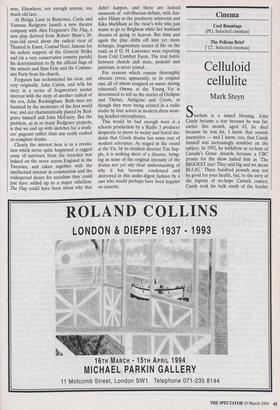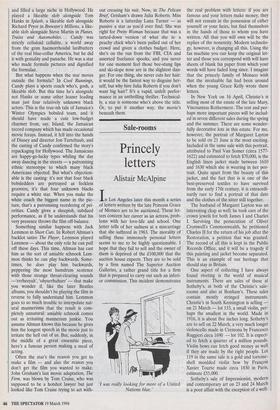Cinema
Cool Runnings (PG, Selected cinemas) The Pelican Brief (`12', Selected cinemas)
Celluloid cellulite
Mark Steyn
Stardom is a mixed blessing. John Candy became a star because he was fat; earlier this month, aged 43, he died because he was fat. I know that sounds insensitive — and I know, too, that Candy himself was increasingly sensitive on the subject. In 1992, he withdrew as co-host of Canada's Genie Awards because a CBC promo for the show hailed him as 'The BIGGEST star! They said big and we mean BI-I-IG.' Three hundred pounds may not be good for your health, but, to the envy of the legions of no-hope Canuck comics, Candy took his bulk south of the border and filled a large niche in Hollywood. He played a likeable slob alongside Tom Hanks in Splash, a likeable slob alongside Richard Pryor in Brewster's. Millions, a like- able slob alongside Steve Martin in Planes, Trains and Automobiles. . . Candy was strictly celluloid cellulite, a world away from the grim haemorrhoidal lardbuttery of the real blue-collar America, but he did it with geniality and panache. He was a star who made formula pictures and dignified the formulae.
But what happens when the star moves outside the formula? In Cool Runnings, Candy plays a sports coach who's, gosh, a likeable slob. But this time he's alongside not Hanks or some other leaner leading man just four relatively unknown black actors. This is the true-ish tale of Jamaica's Winter Olympics bobsled team, and it should have made a cute low-budget charmer from, say, Island, the Jamaican record company which has made occasional movie forays. Instead, it fell into the hands of Disney and director Jon Turteltaub, and the casting of Candy confirmed the story's repackaging for Hollywood. The Jamaicans are happy-go-lucky types whiling the day away dancing in the streets — a patronising ethnic stereotype to which many black Americans objected. But what's objection- able is the casting: it's not that four black bobsledders are portrayed as feckless groovers, it's that four unknown blacks require a white star. When you make the white coach the biggest name in the pic- ture, that's a patronising reordering of pri- orities. Candy gives a sheepish, subdued performance, as if he understands that his very presence throws the film off-balance.
Something similar happens with Jack Lemmon in Short Cuts. In Robert Altman's backlot satire The Player, Lemmon played Lemmon — about the only role he can pull off these days. This time, Altman has cast him as the sort of amiable schnook Lem- mon thinks he can play backwards. Some- times, he does play him backwards, peppering the most humdrum sentence with those strange throat-clearing sounds —`errheeyah', `ohyurrhuhure — that make you wonder if, like the later Beatles albums, you shouldn't be playing the film in reverse to fully understand him. Lemmon goes to so much trouble to interpolate nat- ural mannerisms that the result is com- pletely unnatural: amiable schnook comes out as irritating mannerism junkie. You assume Altman knows this because he gives him the longest speech in the movie just to irritate the hell out of us. But, suddenly, in the middle of a great ensemble piece, here's a famous person making a meal of acting.
Often the star's the reason you get to make a film — and also the reason you don't get the film you wanted to make. John Grisham's last movie adaptation, The Firm, was blown by Tom Cruise, who was supposed to be a hotshot lawyer but just looked like Tom Cruise trying to act with- out creasing his suit. Now, in The Pelican Brief, Grisham's drawn Julia Roberts. Miss Roberts is a latterday Lana Turner — as passive a star as you'd ever find. She was right for Pretty Woman because that was a tarted-down version of what she is: a peachy chick who's been pulled out of her crowd and given a clothes budget. Here, she's on the run from the FBI, CIA and assorted freelance spooks, and you never for one moment feel those bee-stung lips and ski-slope nose are in the slightest dan- ger. For one thing, she never cuts her hair: it would be the fastest way to disguise her- self, but why hire Julia Roberts if you don't want big hair? It's a vapid, unfelt perfor- mance in an unthrilling thriller. Technical- ly, a star is someone who's above the title. Or, to put it another way, the movie's beneath them.



























































 Previous page
Previous page